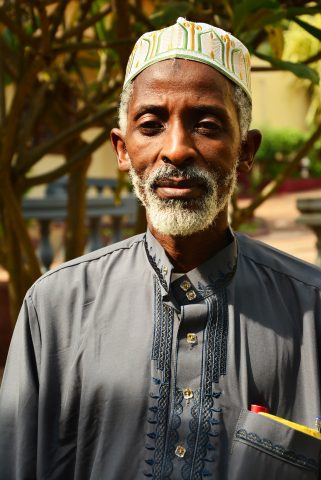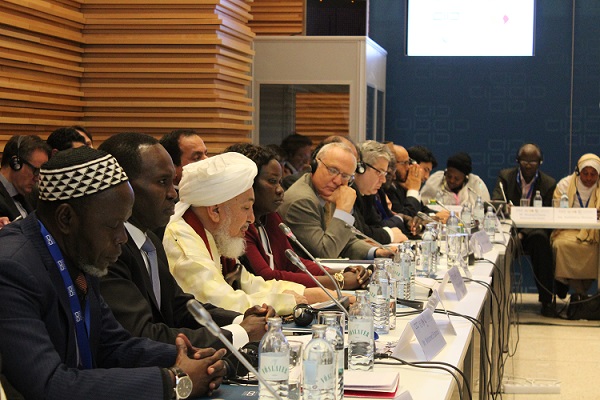22 people were trained in peace mediation and facilitation in November in the Central African Republic (CAR). The attendants came from all districts of Bangui, particularly from Pk5, the Muslim neighbourhood run by auto defence groups, where fresh fighting broke out less than a month ago.
The training was organised in Bangui by Finn Church Aid mixed religious leaders, community leaders, women, men and youth leaders – both Muslims and Christians.
“This quite unusual mix of attendants did not constitute problems. On the contrary, it was an opportunity to peacefully address issues that their communities face. The atmosphere during the training was peaceful, although animated”, says Marine Gourves, peace officer for FCA.
Because the Muslim inhabitants of PK5 do not feel safe in moving around the city in fear of becoming targets for aggression, Finn Church Aid dispatched a mini bus for transporting the participants to a safe area where the training took place.
The authorities and civil society leaders discussed problems within the communities such as issues with the auto defence groups, between vendors at the market, domestic issues between men and women as well as conflict over property.
The first objective of the training was to provide attendants with the knowledge and practice to proceed to basic mediation and facilitate dialog at the community level. Another objective was to strengthen their ability to analyse a conflict and to increase an understanding that behind the public positions taken by each party lie common interests and needs.

Ali Ousmane
Ali Ousmane, Coordinator for the Muslim associations in CAR, confirms that the need for such training is tremendous. He insisted on coming even though he had caught a cold.
“I learnt to be impartial and neutral in the mediation process, and not to influence the outcome. We are facing a far reaching crisis in CAR, a crisis of mentality where the use of violence became a rule. Mediation and facilitation can change mentalities. I think we should have a national mediation institution to help us with that”, Ousmane said.
Finn Church Aid is preparing 15 similar trainings in Bangui and in the prefectures of Ombella Mpoko, Sangha Mbaere and Mambere Kadei with additional participants from the 80 schools FCA is currently supporting.
Right of Return, Housing, Security, and Access to Employment are pressing challenges.
Vienna. Finn Church Aid, the Network for Religious and Traditional Peacemakers and the International Dialogue Centre (KAICIID) with the partnership of the Organization of Islamic Cooperations and the Forum for Promoting Peace in Muslim Societies organized Central African Republic Conference on Intra-Muslim Mediation and Capacity Building to enhance inter-religious reconciliation and social cohesion in Central African Republic (CAR) 25-27th of February 2016.
Over 40 Muslim leaders leaders, representatives from Muslim women and youth communities and civil society met in a facilitated dialogue to explore how the Muslim community in the Central African Republic, which has been challenged by internal divisions in the past, could cohesively address the problems facing Muslims in the aftermath of the civil conflict that devastated the country.
The Muslim leadership of Central African Republic unanimously agreed to work together on a range of common issues, including but not limited to supporting the return of all refugees, from any religious background, who have been displaced by the recent conflict in the country.
High level participation
The meeting was also attended by a number of international observers, including noted scholar Sheikh Bin Bayyah, U.S Ambassador-at-Large for International Religious Freedom David Saperstein, Ufuk Gokcen, OIC Ambassador and Permanent Representative to the United Nations, New York and the U.S. Acting Speacial Envoy for the Organization of Islamic Cooperations.
To express support from CAR’s Christian communities and the government, the Archbishop of Bangui, Dieudonne Nzapalainga, Reverend Nicolas Guerekoyame-Gbangou, and the Minister of National Reconciliation and Political Dialogue H.E. Lydie Florence N’Douba actively participated as observers.
“The idea of this conference was born out of the high level inter-religious delegation to CAR in April 2014 organized by the FCA, the Network and the U.S. State Department. Since then the Network has partnered with the International Dialogue Center (KAICIID) and worked closely with the Muslim Communities in CAR, the Transitional Government, The Inter-religious Platform and the International NGO’s to make this conference a success” stated Dr. Mohamed Elsanousi, Director of the Network for Religious and Traditional Leaders, Washington Office.
Dr. Elsanousi added that, the Finn Church Aid office in Bangui has been contributing to the advancement of peace in CAR since the crises and has played a major role to make this conference a reality.
KAICIID Secretary General, Faisal Bin Muaammar, congratulated the participants for their courage and openness in dialogue: “We must agree that we take from this terrible crisis an opportunity to rebuild this nation as the citizens wish to see it. The Central African Republic prior to the crisis was a model for positive interreligious coexistence: you have a chance to rebuild that model, to rebuild a nation where every citizen has an equal share in the rights and responsibilities of citizenship.”
Bin Bayyah: All Muslim and Christian groups should have tolerance
Shaykh Abdallah bin Bayyah, the President of the Forum for Promoting Peace in Muslim Societies, urged greater unity among Muslim peacemakers, “Peace is the path to justice and revenge must be replaced with honest discussions, questions, and dialogue. All Muslim and Christian groups should have tolerance. All must agree on a goal, and this goal should be peace. The Christian and Muslim groups should have groups from within their communities that represent them and are able to speak on their behalf to advocate for peace”.
Ambassador David Saperstein said that he was honored to participate in this noteworthy conference, and expressed his confidence that it would help rebuild diversity and unity in communities in CAR. Ambassador Saperstein encouraged the particiants, saying, “Today, in my opinion, we begin the process of discussing one of the most important questions about CAR’s development: what will be the role of the Muslim community and how can we facilitate a return to the harmony and brotherhood that existed in the past, and which has been broken by recent violence, and reinvigorate the social cohesion so vital to CAR’s future.”

Sheikh Abdallah Bin Bayyah during the closing remarks.
Right of return, housing and security pressing challenges
Challeneges remain. Returning refugees should be re-integrated into society, and enjoy access to housing, education and work. Women’s and youth inclusion in the peacebuilding process is far from complete. Lack of educational and economic opportunities for youth, increases growth in crime, as well as drug addiction and trafficking. Extremists could exploit youth’s marginalization to increase recruitment.
The participants were concerned by systemic state discrimination of Muslims, and highlighted the citizenship law’s implentation to deny Muslims full citizenship. They also expressed concern that Muslims are often denied access to jobs on the basis of their religion.
The participants agreed to form a follow-up committee to implement the outcomes of this meeting, which were formulated in an action plan.
The teachers are returning to school in Bangui PK5 area after two years of absence. Some activities have been held during these two years but with no official teachers and no standard curriculum.
The schools have been closed mainly because of unstable security situation and the fact that teachers have been unwilling to come to school as they have feared for their own security. We will also provide training for the teachers and teaching materials and also organise bus transportation for the teachers for two weeks.
For the first time in two years, teaching will follow the standard curriculum.
FCA has taken the lead since the beginning of December to restart the activities of international NGOs in the Muslim enclave. Teachers, a local Imam, representatives from the Parent Teacher association, and local authorities as well as Ministry of Education are involved in the effort.
The official reopening will be held later this winter.

